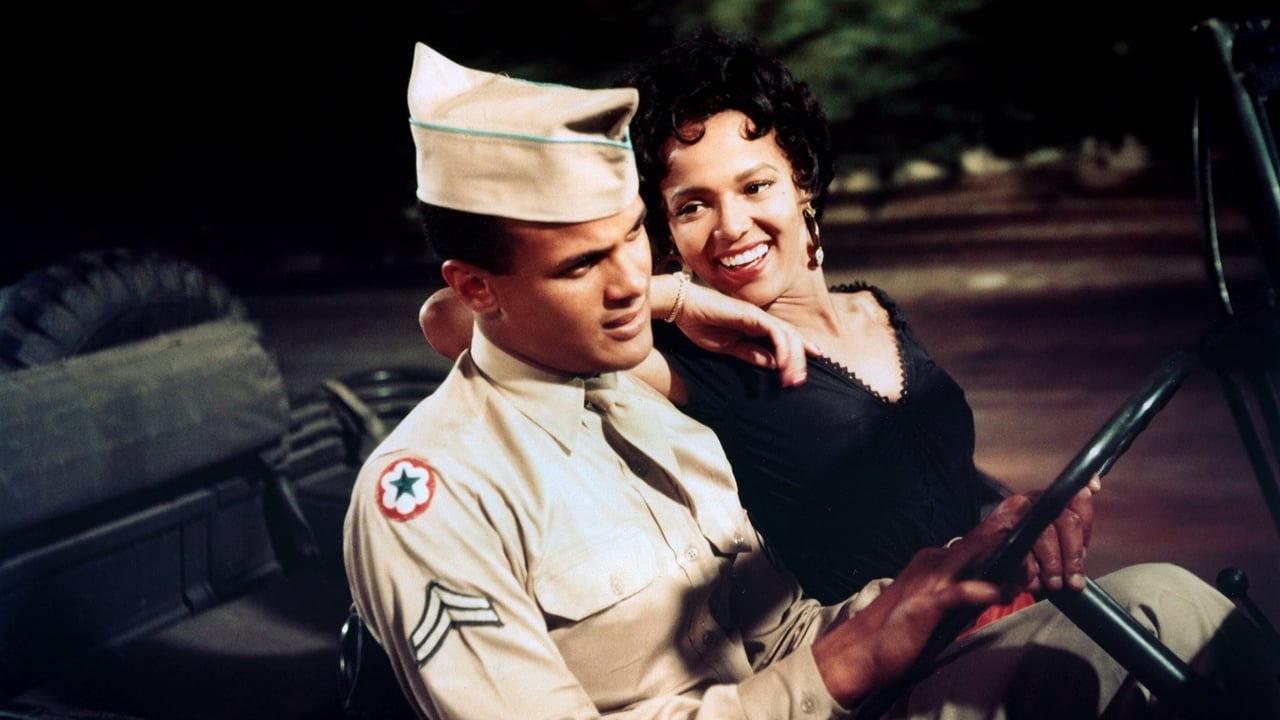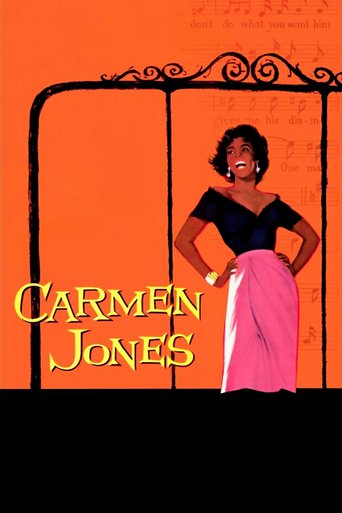

"Carmen Jones" (1954) A musical based on an opera, with an African American cast. A few good musical numbers in between incongruous telling of a story. Promising young army man loves simple good woman. Man is assigned to take not so simple and not so good vixen to civilian authorities. Not so good woman manipulates and seduces man into not so promising man. Woman escapes. Man falls very hard for seductive vixen woman. Not so good woman tries to love him back, tries to be faithful, but eventually finds herself needing the baubles and trinkets of rich men. She "don't account to no man" and love "don't give you no right to own me". Man gives up everything only to find woman he loves with another man. Once promising young army man on his way to flight school strangles not so simple and not so good vixen to death. A racial musical Cliché, contrived tragedy Makes fun but that's all #Haibun #PoemReview
... View MoreCarmen Jones (Dorothy Dandridge) is great as a tempestuous she-devil, tempting and playing around with straight-shooting Joe (Harry Belafonte) as he prepares to go to flight school at a Southern army camp during World War II. The two meet at the camp where Carmen also works. When she gets in trouble, Joe's Sergeant (Brock Peters) makes Joe escort Carmen to a civilian court for trial. But, taking care of Carmen is more than he is capable of. First, she coaxes him to her hometown. Then she coaxes him to Chicago to see Husky Miller's boxing match with some of Husky's groupies, including Frankie (Pearl Bailey) and Myrt (Diahan Carroll).In the title role, Dorothy Dandridge, was the first black woman to be nominated for a Best Actress Academy Award. The movie is loaded with many other "firsts": first all-black cast in a color CinemaScope musical, first musical adaptation of Bizet's opera with lyrics by Oscar Hammerstien, and the first musical directed by Otto Preminger.Carmen Jones is great musical, full of fun, dancing, and song, and I was happy to see some of the old black stereotypes broken. For example, most speech and behavior patterns seemed more natural and fluid to me as a white person. One has a feeling that this movie is fairly up to date for the 1940s--unlike Porgy and Bess which was a Gershwin opera set in a poor black fishing village in 1912 South Carolina.In spite of all of its superlatives, the movie does seem somewhat disjointed at times—hard to explain.. However, I think Dandridge's performance was worthy of an Oscar.
... View MoreContemporary version of the Bizet opera, with new lyrics and an African-American cast.Most critics loved it, but Channel 4 called it "a truly dreadful film. Preminger can't be faulted for ambition, but for once, his execution is sorely lacking... Dandridge's tough, hip-swinging, steely eyed Carmen goes some way to redeeming things, but the part is too fractured by the imposition of another singing voice, bad dubbing, and the alien tone of the songs." In 1992, Carmen Jones was selected for preservation in the United States National Film Registry by the Library of Congress as being "culturally, historically, or aesthetically significant". Indeed, it has earned this -- a film adaptation of a play adaptation of an opera. And one of the first big films with an all-black cast. That was ground-breaking in the 1950s.For me, I did not really get into it. But that was because this really is not my kind of music. For those who like "Carmen", you may love this movie.
... View MoreI am not really an opera buff, so I have not taken a lot of interest in films based upon operas; the few I have seen have not really convinced me that this is an art-form that transfers well to the cinema screen. "Carmen Jones" is different, largely because the opera on which it is based is different. Georges Bizet's "Carmen" was controversial when it was first produced in the 1870s, largely because it did not fit into either of the two then accepted categories of opera. Its spoken dialogue, working-class characters and merry tunes were more reminiscent of comic opera than of grand opera, but its plot, centred upon sexual passion, jealousy and murder, is far from comic. In some respects the work even in its original form is closer to a Broadway musical than it is to traditional ideas of opera, so it was not surprising when, in 1943, Oscar Hammerstein turned it into just that.Hammerstein kept Bizet's music and the basic outlines of his plot but provided new lyrics and updated the story from nineteenth-century Spain to America in World War II. In this version Carmen works in a parachute factory, and her lover (named Joe rather than Jose) is a GI with ambitions to train as a pilot. Most of the main characters have similar names to those in the opera; Carmen's friends Frasquita and Mercedes become Frankie and Mert (presumably a diminutive of Myrtle), Lillas Pastia is Billy Pastor and the bullfighter Escamillo becomes (a rather strained one this) the boxer Husky Miller. The one exception is Micaela who should by rights have been Michelle but instead becomes Cindy-Lou.The stage musical had one distinctive feature which is faithfully followed in the film; an all African-American cast. Although the film has far more actors than most stage productions would, there is not a single white face to be seen, not even as a minor character, not even as an extra in the crowd scenes. A times this can seem a bit unrealistic (are there really no white boxing fans in Chicago?) but the aim was presumably not realism but symbolism. In the 1950s Hollywood was still a very racist institution, with black actors generally limited to minor roles, often as servants or other working-class characters. Most films had all-white casts, even in situations where one might have expected to see some black faces. By making "Carmen Jones" with an all-black cast, the filmmakers were sending out a message, not only about the talents of black performers, but also about their unfair treatment within the film industry.Since her tragic early death from an accidental overdose, Dorothy Dandridge has become known as the "black Marilyn Monroe", and her performance here shows her to have been just as beautiful and at least as talented as Marilyn herself. She received a nomination for a "Best Actress" Oscar, something Marilyn never achieved. (She was the first African-American actress so nominated). This should have been the part that made Dandridge's career, but in fact she had to wait three years for her next film role. I doubt if any white Oscar nominee would have had that problem. Harry Belafonte, her co-star here, also appears in that film, "Island in the Sun". Oddly enough, although Dandridge and Belafonte were as well-known for their singing as they were for their acting, their singing voices are both dubbed in "Carmen Jones". Perhaps they were considered to be not "operatic" enough for their roles.Belafonte was not Oscar-nominated, but he is very good as Joe, making sympathetic a character who could easily have been seen simply as a self-destructive idiot. (Joe does, after all, sacrifice both his relationship with his loving sweetheart Cindy-Lou and a promising military career for the sake of a woman who eventually rejects him). Dandridge also has a difficult balancing act to perform, needing to make Carmen seductive and alluring but not so hard and amoral that she forfeits our sympathy altogether. (The film character is perhaps rather more sympathetic than her counterpart in the opera, a work that sometimes strikes me as being rather misogynistic in tone).Like a number of fifties musicals, "Carmen Jones" can today seem somewhat dated. Apart from the sterling contributions of its two stars, however, it does have one great advantage in its music; for a story that ends tragically there are a surprisingly large number of light-hearted, cheerful melodies. Even though he had been dead for nearly seventy years, Hammerstein had found in Bizet a collaborator even more gifted than Richard Rodgers. 7/10
... View More